A Musically Satisfying Mendelssohn Octet in E Flat Major Demo Disc From Chasing the Dragon
lets you compare analog vs. digital, 33 1/3 vs, 45, 1/2 speed to normal, tube vs. transistor mics
Mendelssohn completed his Octet in E Flat Major when he was 16 years old. Good thing he started composing brilliant pieces while young because he was dead at 38. After completing the piece, dedicated to his violin teacher Eduard Rietz, Mendelssohn gave him the score as a birthday present on October 17, 1825. Rietz copied out all of the parts and it was quickly performed in an informal family gathering. Rietz lived an even shorter life. Tuberculosis got him at age 30.
Chasing the Dragon chose this Mendelssohn string octet written for four violins, two violas and two cellos to give listeners a chance to hear an engaging, harmonically complex piece of music well played and to hear a part of it cut "standard" 33 1/3, part of it 1/2 speed mastered and the final part "Presto" cut at 45rpm. The Octet was a 192/24 bit recording using a spaced pair of AKG C12 Omni microphones.
There's also a short piece on this double disc, "Two Guitars" by Ivan Vasiliev, recorded using the Octet's setup as well as five additional versions using a tube microphone, a solid state mic, analog via a Studer A820 running at 30IPS, a tubed mic Blumlein pair and a Binaural head. "Two Guitars" is not played on guitar—something not noted in the annotation, nor is there anything in the notes about the piece, or the instrumentation, which at first can be confusing, especially if you're expecting to hear "two guitars"!
This is very well balanced, nicely spaced recording produced in London's Henry Wood Hall, a moderate-sized rehearsal and recording venue large enough to accommodate a symphony orchestra and small enough to yield an intimate-sounding recording like this one that's got an abundance of hall space but not to where the ensemble is swamped.
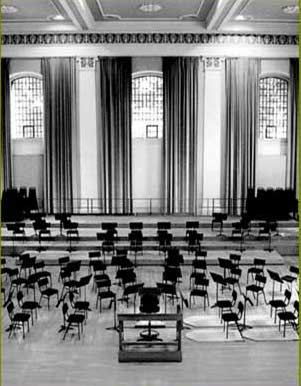 Producers Mike and Francoise Valentine sat the musicians in a semi-circle on the wooden floor in front of the risers as seen in the jacket photo:
Producers Mike and Francoise Valentine sat the musicians in a semi-circle on the wooden floor in front of the risers as seen in the jacket photo:
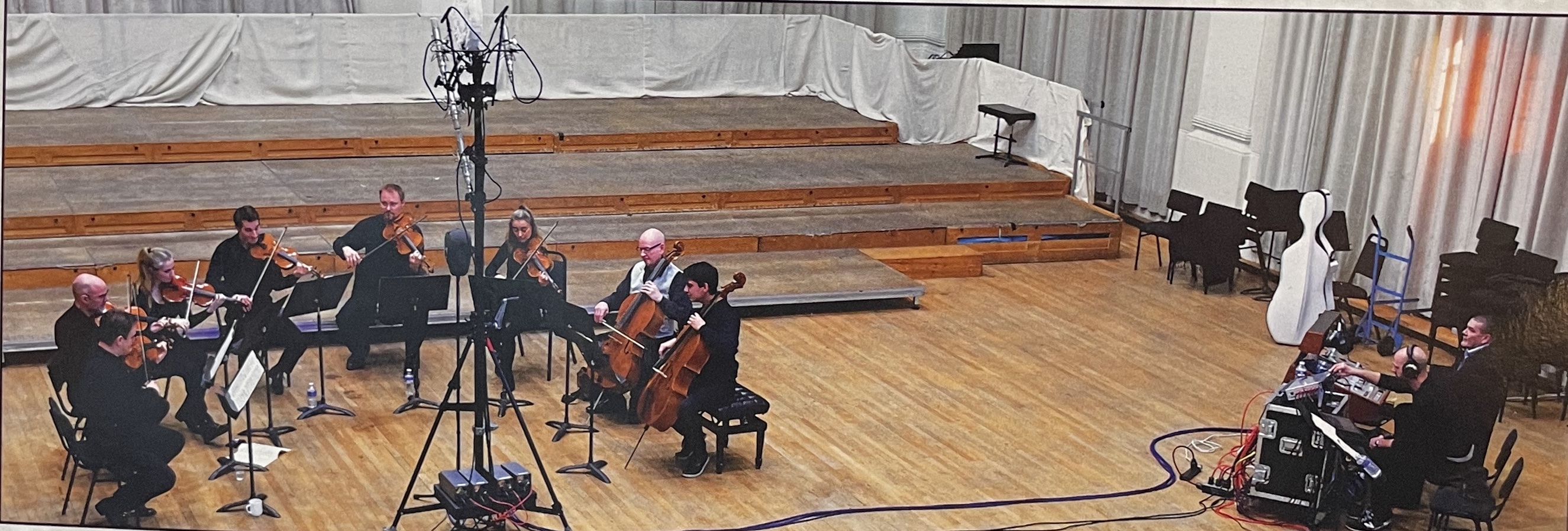 Photo: Kevin Baker
Photo: Kevin Baker
My "go to" version of this piece is the RCA Soria Series 3 LP box set The Heifetz-Piatigorsky Concerts With Primrose, Pennario and Guests (LDS 6159), commemorating a series of 1961 Heifetz-Piatigorsky concerts at the outdoor Pilgrimage Theater, Hollywood, California.
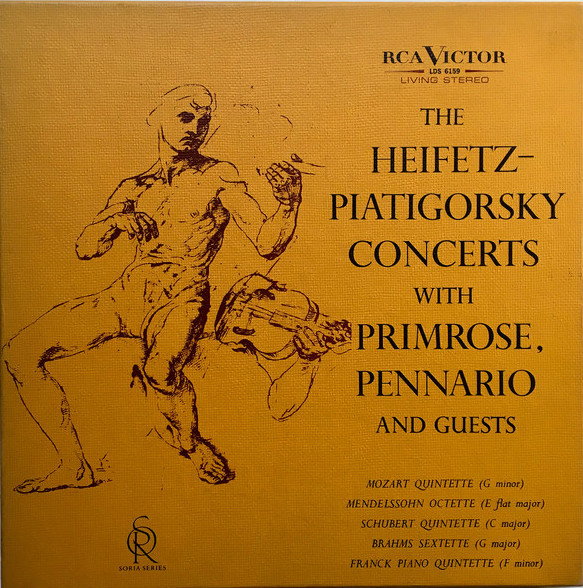
I picked up the near mint copy for $3 at a garage sale back when vinyl was "toxic."The Soria set was a series of studio, not live recordings, with the players similarly seated:
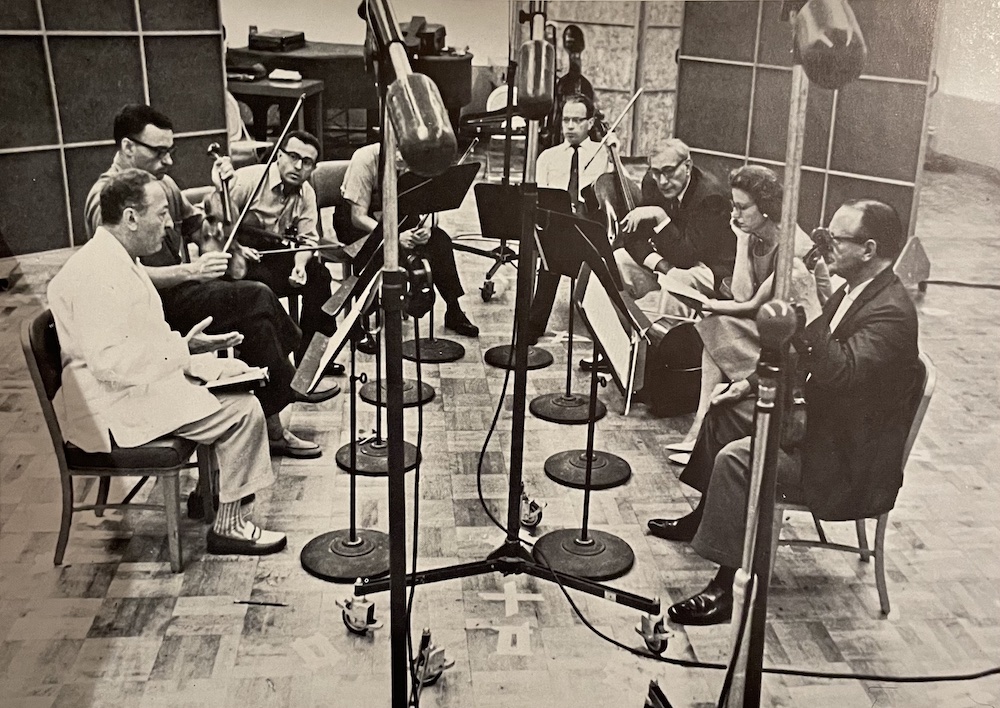
It's obviously a drier acoustic with a velvety, seductive string sound and features (L-R) Heifetz, Israel Baker, Arnold Belnick, Joseph Stepansky, Gabor Rejto, Gregor Piatigorsky, Virginia Majewski and William Primrose. The recording engineer was Dave Hassinger. Yes, the same Dave Hassinger who a few years later would record The Jefferson Airplane and The Rolling Stones.
Few ensembles can compete with this crew then or now but the well-experienced, talented Locrian Ensemble led by 1st violinist Jack Liebeck does a fine, somewhat more measured job here, bringing to life the brash adolescent's audacious, difficult to play piece. If you buy this for the demo comparisons, fall for the Octet and then seek out additional performances, mission accomplished!
As for what I heard, first of all, these days, if you start with good microphones properly placed in a good space as is the case here your choice of storage media is less consequential than it used to be. The digits won't be an issue as you'll appreciate the textures and timbres produced by the ensemble and experience the space. The short demo piece made for an interesting set of comparisons. Producer Valentine doesn't say he got the Studer recording on the disc: did he have mastering engineer Webber swap inputs "on the fly" to get the Studer recording cut AAA to disc? Or did he digitize before cutting. Whichever it was there was—at least to my ears—a noticeable improvement in transient clarity and transparency to the pizzicato strings on the piece compared to the digital versions or was it the dreaded conformational bias??????????? Judge for yourself.
As for the other listening tests, again, judge for yourself. Who am I to tell you what to hear? What I'd really like for the Valentines to produce is an entire side of symphonic music—20 minute's worth—AAA on one side and DDA on the other.



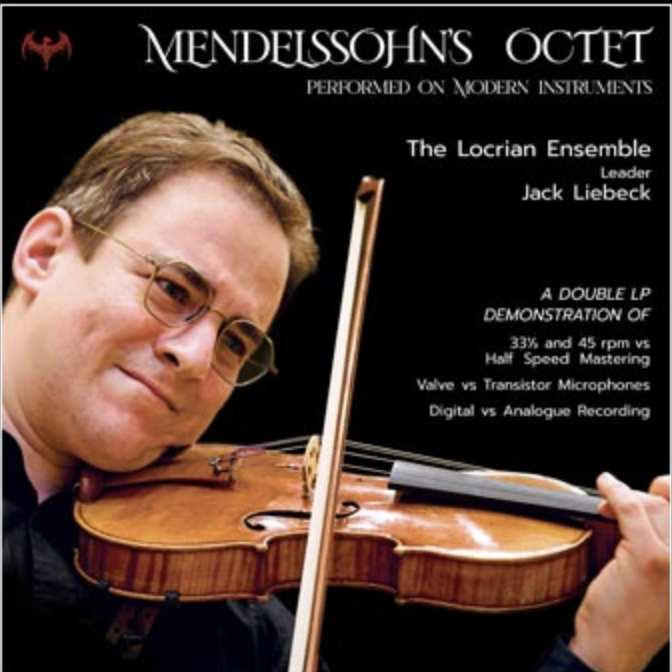




































.png)








